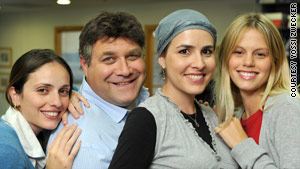English comedian Ricky Gervais created the original British version of The Office, which quickly jumped across the Atlantic to the U.S. Here, no one was quite sure the hit NBC comedy could ever be the same after Michael Gary Scott left Dunder Mifflin, but this hasn’t stopped other countries from playing on the formula the British series developed. Enter the Israeli version of The Office, HaMisrad, which launched in 2010. The show is a surefire hit – it keeps the original’s quirky character concepts but makes more political statements than the American or British versions (which is generally appropriate for Israeli TV shows). In so doing, HaMisrad challenges stereotypes which are far too often invoked as justification for violent action.

For example, Abed, one of the main characters, is a gay Arab. Actor Jamil Khoury told CNN, “Arab stereotypes are not so bright — stupid sometimes — but this Abed guy, he turns everything around, he knows a lot.” By portraying Abed as an intelligent individual working a steady 9-5 job, HaMisrad debunks several Arab stereotypes. For one, as Khoury remarks, this intelligent worker contrasts the stereotypical unintelligent Arab taken up by religious violence with a smart person working a normal job. The implication is that if there can be smart Arabs in an Average Joe office setting, there are likely more out in the rest of the world, too; not all Arabs are brainwashed into jihad. Still, even in his own office, Abed is the “other,” mirroring the real-life situation in Israel, in which Arabs and Jews are often separated or polarized. Depicting Abed as a normal citizen who just happens to be Arab shows that not all members of that ethnic group should be automatically feared.
Moreover, Abed confronts Middle Eastern notions about homosexuality. Iranian president Mahmoud Ahmadinejad has famous proclaimed that homosexuality is a western phenomenon, while condemnation of homosexuality – and the corresponding punishment of gay individuals – has occurred across the Arab world. Besides poking holes in the obviously false notion that being gay is “just for the west,” Abed can serve as both a lesson and a role model for gay Arab youth. As CNN notes, Abed’s fellow office workers catch him kissing a man in one episode. This “discovery” of homosexuality, and outing to a potentially hostile community, is an experience to which many closeted Arabs can likely relate. Abed has to deal with religio-cultural and ethnic stereotypes in expressing his sexuality, but, ultimately, comes out on top, which can serve as an encouraging example for others.
HaMisrad also examines other sorts of individuals subject to stereotypes, like Yossi, an Ethiopian immigrant, and Leah, a Haredi Jew who is often pregnant. This commitment to exploring what is behind such conventions and the potential falsehoods behind them is admirable. In a nation in which racism and division often occlude the spirit of the peoples that live there, comedy is a wonderful tool to take a look at just what divides Israelis of all types. By putting racial, sexual, religious, and cultural stereotypes under the microscope, HaMisrad can help Israelis and other individuals see past a stereotype and appreciate the beautiful diversity of Israelis.
Carly Silver is a senior at Barnard College, Columbia University, majoring in religion and minoring in ancient studies. Originally from Weston, Connecticut, she is currently trying to pay for college by playing the ponies at a Tri-State area racetrack. Her column, Twenty Thousand Leagues From Hillel, appears here on alternating Fridays.
